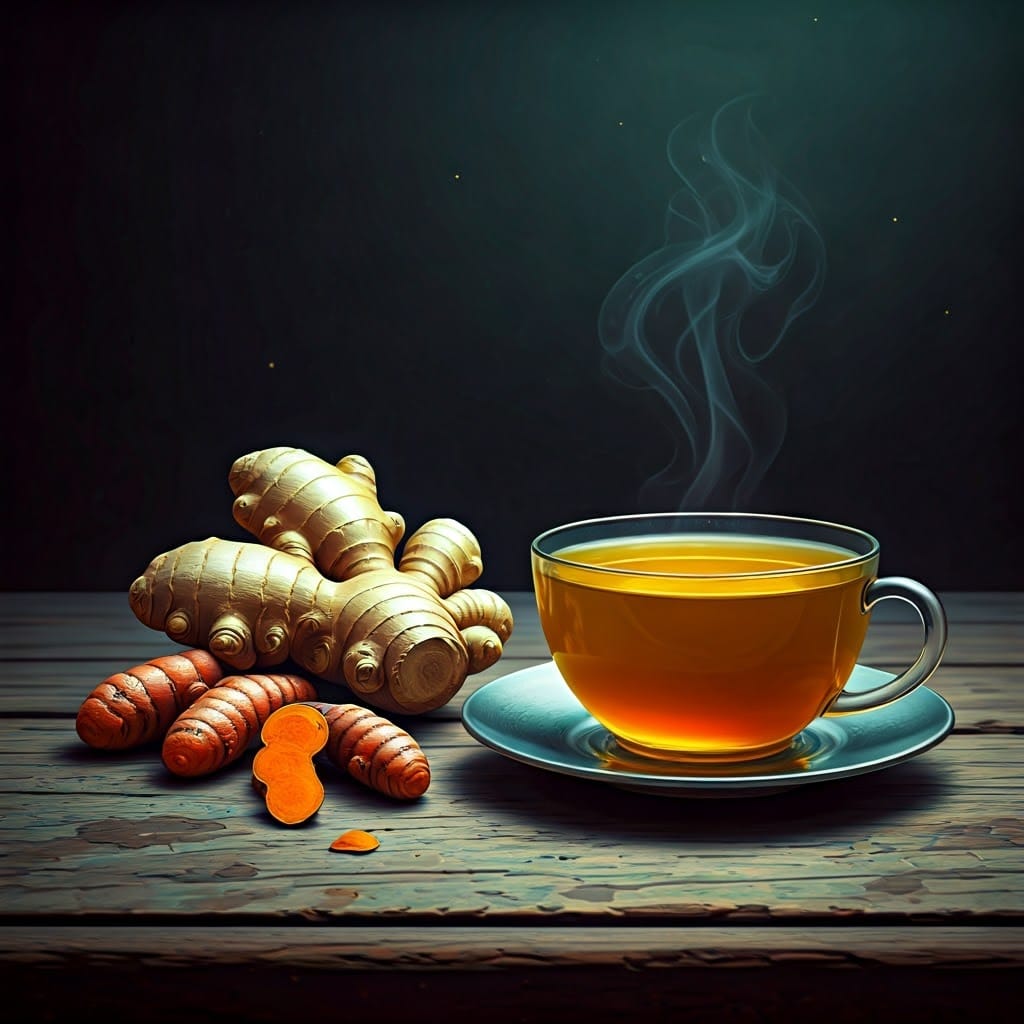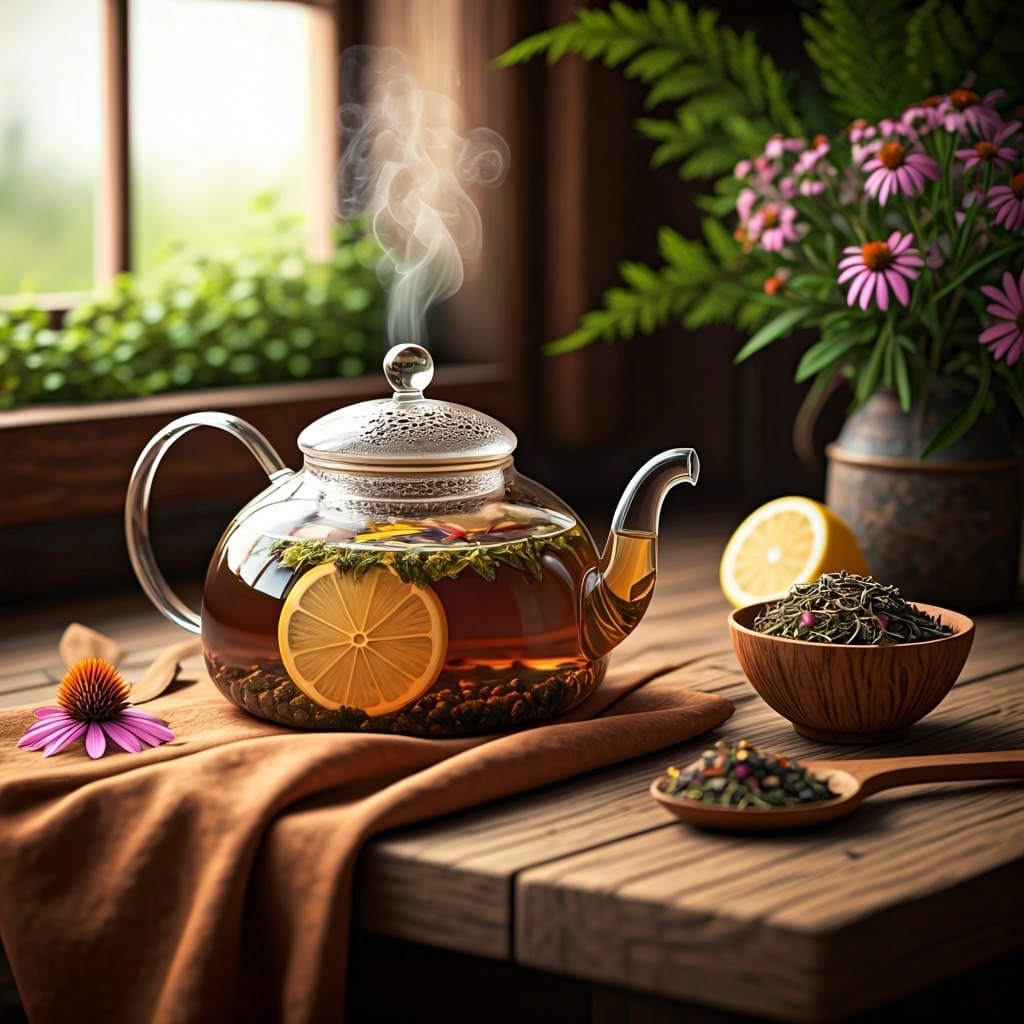Herbal teas have long been cherished not only for their soothing qualities but also for their ability to promote health and vitality. When it comes to boosting immunity naturally, many herbal teas are loaded with bioactive compounds that support the immune system in a variety of ways. Let’s explore some of the most popular immune-boosting herbal teas and the mechanisms behind their health benefits. Additionally, we’ll review relevant studies that support these claims to provide a clearer understanding of why these teas are so effective.
1. Echinacea Tea
Mechanism: Echinacea is one of the most well-known herbs when it comes to supporting the immune system. It contains compounds like alkamides, chicoric acid, and polysaccharides, which are thought to stimulate white blood cell production, helping the body fight off infections. The active compounds in Echinacea may increase the activity of macrophages and neutrophils, two types of immune cells that are essential for combating pathogens.

Scientific Support: Multiple studies suggest that Echinacea can reduce the severity and duration of colds. A 2014 study published in the Cochrane Database of Systematic Reviews found that Echinacea reduced the risk of developing a cold by 10–20%. Another study, published in The Lancet Infectious Diseases in 2005, concluded that Echinacea extract had a significant effect on reducing the duration and symptoms of upper respiratory infections.
How It Helps Immunity: Echinacea stimulates the production of white blood cells, which are key components of the immune system that protect against bacteria, viruses, and other pathogens. It may also have anti-inflammatory effects, helping the body to manage inflammatory responses without overreacting.
2. Ginger Tea
Mechanism: Ginger contains bioactive compounds like gingerol, which possess antioxidant, anti-inflammatory, and antimicrobial properties. These compounds are thought to enhance immune function by reducing inflammation and oxidative stress, two factors that can compromise immune defenses. Ginger also supports digestion, which in turn can help with nutrient absorption, crucial for overall immune health.

Scientific Support: A 2013 study published in The American Journal of Clinical Nutrition found that ginger has strong antioxidant effects and may help enhance the body’s immune response to infections. Additionally, a 2016 study in The Journal of Medicinal Food highlighted the antimicrobial properties of ginger and its ability to inhibit the growth of certain bacteria.
How It Helps Immunity: By reducing inflammation and fighting oxidative stress, ginger helps to maintain optimal immune function. Chronic inflammation and oxidative stress can impair immune responses, and ginger’s compounds work to neutralize free radicals and decrease inflammatory responses. Moreover, ginger may promote circulation, ensuring that immune cells are efficiently delivered throughout the body.
3. Turmeric Tea (with Black Pepper)
Mechanism: The active compound in turmeric, curcumin, is known for its potent anti-inflammatory and antioxidant properties. Curcumin works by modulating the immune system, helping to promote a balanced immune response. It can regulate the activity of immune cells like T-cells, B-cells, and macrophages. When paired with black pepper, which contains piperine, the bioavailability of curcumin is significantly enhanced, allowing for better absorption in the body.
Scientific Support: A study in The Journal of Alternative and Complementary Medicine (2009) found that curcumin could enhance immune function by promoting the production of certain cytokines, molecules that are important for immune system signaling. A 2017 study in Frontiers in Pharmacology also highlighted curcumin’s ability to modulate immune cell activity and reduce chronic inflammation, which can improve overall immune health.
How It Helps Immunity: Curcumin’s anti-inflammatory effects prevent excessive immune responses, which can be harmful, while promoting the function of immune cells involved in fighting pathogens. Additionally, turmeric may help to reduce symptoms of autoimmune diseases by regulating immune responses, balancing immune function, and protecting cells from oxidative damage.
4. Peppermint Tea
Mechanism: Peppermint is rich in menthol, which has natural antimicrobial properties. Studies have shown that peppermint can inhibit the growth of several bacteria and fungi, contributing to immune system support. Additionally, peppermint has anti-inflammatory properties that help reduce the burden on the immune system by lowering chronic inflammation.

Scientific Support: A 2017 study published in Phytotherapy Research demonstrated the antimicrobial effects of peppermint against common pathogens like E. coli and Staphylococcus aureus. The study also suggested that peppermint’s anti-inflammatory properties can help regulate immune responses. Furthermore, a study in The Journal of Ethnopharmacology (2015) confirmed that peppermint oil can modulate immune activity by promoting the function of immune cells like lymphocytes.
How It Helps Immunity: Peppermint’s ability to fight pathogens combined with its anti-inflammatory effects creates an environment in the body that is conducive to proper immune function. Its antimicrobial effects are especially beneficial when fighting off respiratory infections, which are often caused by bacteria and viruses.
5. Elderberry Tea
Mechanism: Elderberry has been used for centuries to treat colds and flu. The active compounds in elderberries, such as anthocyanins, flavonoids, and vitamins A, C, and E, help to reduce inflammation and enhance the body’s immune responses. Elderberry is believed to act by binding to viral particles, preventing them from entering and infecting cells, which may help reduce the severity and duration of viral illnesses.

Scientific Support: A 2019 study published in Nutrients found that elderberry extract significantly shortened the duration of cold symptoms. A previous study from 2004 published in The Journal of International Medical Research also showed that elderberry extract reduced flu symptoms by as much as four days in patients with the flu.
How It Helps Immunity: Elderberry supports immune function by boosting the production of cytokines, which play an essential role in immune responses. Additionally, the anthocyanins found in elderberries have antioxidant properties that help to prevent oxidative damage to immune cells, ensuring they remain functional and capable of responding to infections.
6. Licorice Root Tea
Mechanism: Licorice root contains glycyrrhizin, a compound that has been shown to possess anti-inflammatory, antiviral, and immune-boosting properties. Glycyrrhizin enhances the function of macrophages and T-cells, both of which play a critical role in immune defense. It also has the ability to modulate the production of cytokines, improving the body’s ability to fight infections without overreacting.
Scientific Support: A 2017 review in The Journal of Clinical and Experimental Hepatology highlighted the antiviral effects of licorice root, particularly its ability to fight respiratory viruses. Other studies, including a 2016 study in Phytomedicine, have shown that licorice root has the potential to boost immune function by increasing the production of cytokines and improving macrophage function.

How It Helps Immunity: Licorice root has a dual effect on the immune system. It not only enhances the body’s ability to fight viral and bacterial infections, but it also helps to reduce inflammatory cytokines that can trigger an overactive immune response, promoting a more balanced immune function.
Conclusion: Harnessing the Power of Herbal Teas for Immunity
Herbal teas offer a natural, accessible, and effective way to support immune health. By understanding the mechanisms through which these teas work, we can see that they provide a multi-faceted approach to strengthening the immune system. Whether through enhancing the production of immune cells, reducing inflammation, or directly fighting pathogens, the herbs in these teas each bring something unique to the table.
While herbal teas can be a fantastic addition to your daily routine, it’s important to remember that no single food or drink can replace a healthy lifestyle. A balanced diet, regular exercise, proper sleep, and stress management all contribute to a robust immune system. However, by incorporating immune-boosting herbal teas into your routine, you can give your body an extra line of defense, making it better equipped to fend off infections and stay healthy year-round.
